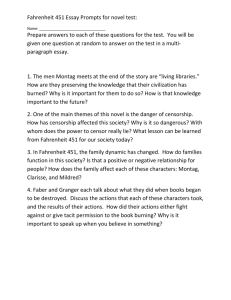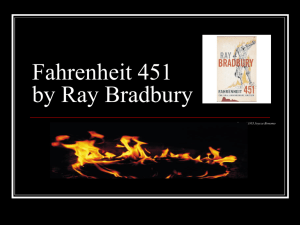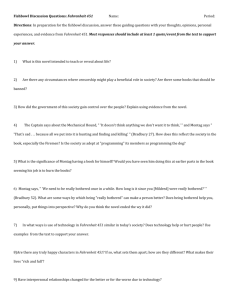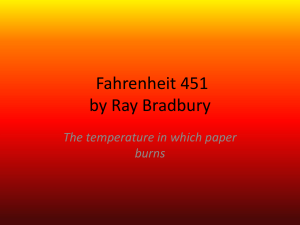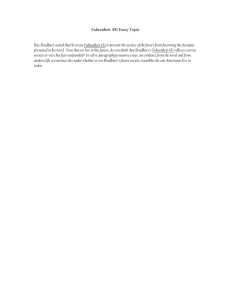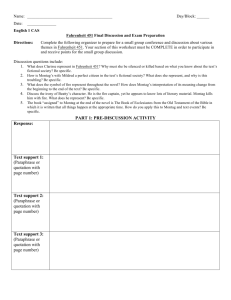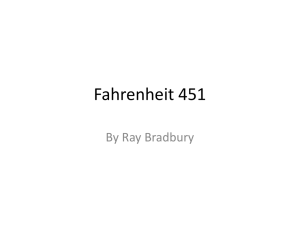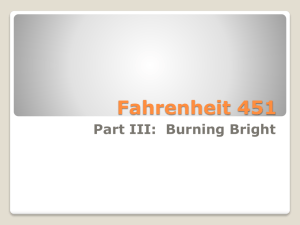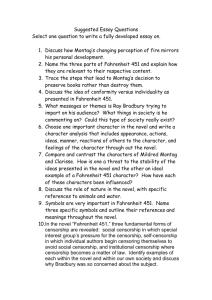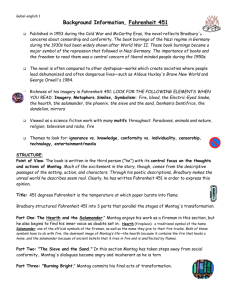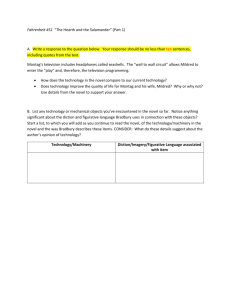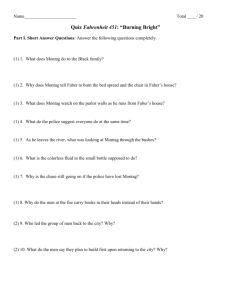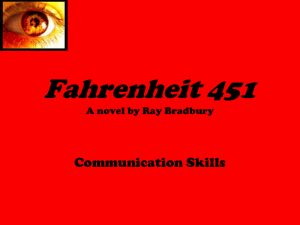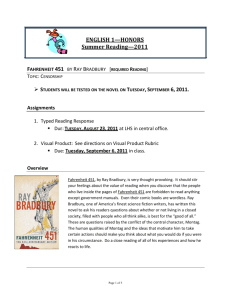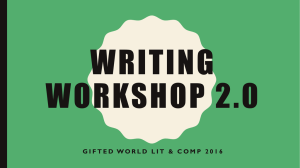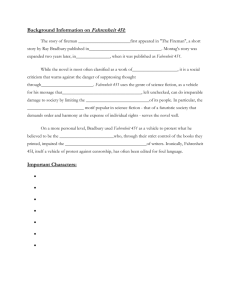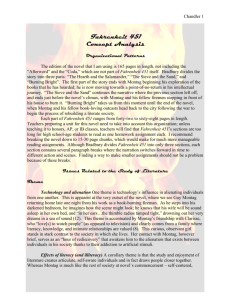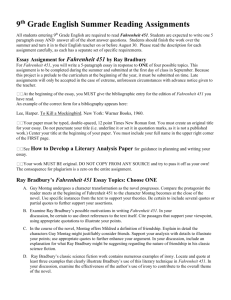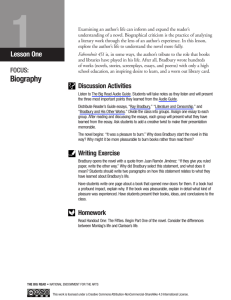Fahrenheit 451 Themes.doc - Tupper Secondary English
advertisement
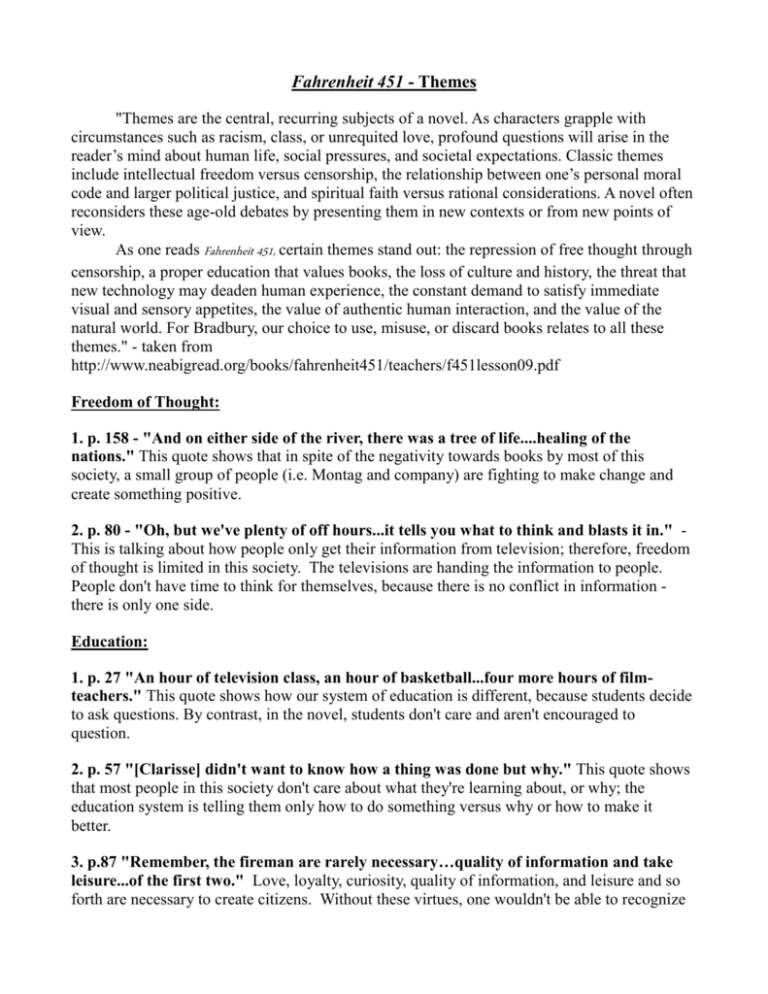
Fahrenheit 451 - Themes "Themes are the central, recurring subjects of a novel. As characters grapple with circumstances such as racism, class, or unrequited love, profound questions will arise in the reader’s mind about human life, social pressures, and societal expectations. Classic themes include intellectual freedom versus censorship, the relationship between one’s personal moral code and larger political justice, and spiritual faith versus rational considerations. A novel often reconsiders these age-old debates by presenting them in new contexts or from new points of view. As one reads Fahrenheit 451, certain themes stand out: the repression of free thought through censorship, a proper education that values books, the loss of culture and history, the threat that new technology may deaden human experience, the constant demand to satisfy immediate visual and sensory appetites, the value of authentic human interaction, and the value of the natural world. For Bradbury, our choice to use, misuse, or discard books relates to all these themes." - taken from http://www.neabigread.org/books/fahrenheit451/teachers/f451lesson09.pdf Freedom of Thought: 1. p. 158 - "And on either side of the river, there was a tree of life....healing of the nations." This quote shows that in spite of the negativity towards books by most of this society, a small group of people (i.e. Montag and company) are fighting to make change and create something positive. 2. p. 80 - "Oh, but we've plenty of off hours...it tells you what to think and blasts it in." This is talking about how people only get their information from television; therefore, freedom of thought is limited in this society. The televisions are handing the information to people. People don't have time to think for themselves, because there is no conflict in information there is only one side. Education: 1. p. 27 "An hour of television class, an hour of basketball...four more hours of filmteachers." This quote shows how our system of education is different, because students decide to ask questions. By contrast, in the novel, students don't care and aren't encouraged to question. 2. p. 57 "[Clarisse] didn't want to know how a thing was done but why." This quote shows that most people in this society don't care about what they're learning about, or why; the education system is telling them only how to do something versus why or how to make it better. 3. p.87 "Remember, the fireman are rarely necessary…quality of information and take leisure...of the first two." Love, loyalty, curiosity, quality of information, and leisure and so forth are necessary to create citizens. Without these virtues, one wouldn't be able to recognize what's really going on in society, etc. Happiness: 1. p. 8 "Of course I'm happy... [Montag] moved his eyes quickly away." Montag is in denial; he tells himself he's happy, but he's not. He makes reference to something "peering down at him" from behind the grill. Perhaps this is an early reference to the books he's hidden? 2. p. 9 "[Montag] was not happy...he said the words to himself." This shows that Montag finally admits that he's not happy with the way life is. In the novel, the characters define happiness through social class and material goods. By contrast, Bradbury wants us to define it through emotions, family, meaningful relationships, search for knowledge and truth, etc. Knowledge: 1. p. 144 Granger says, "'The Book of Ecclesiastes would be fine. Where was it?...then touches [Montag's] head." This interesting passage shows how much Montag has changed. In the beginning, he was burning books while at this point in the novel (at the end), he's fighting to save books. p. 51 "There must be something in books, things we can't imagine, to make a woman stay in a burning house; there must be something there. You don't stay for nothing." Simply put, Bradbury is writing about the power of books (and ideas) to change the way people think, to give people a sense of freedom of thought, to make sense of the world. This is especially powerful in a totalitarian state such as the one in Fahrenheit 451. Additional Themes (similar to thesis statements) from the Novel: 1. In Fahrenheit 451, we see how a person can change through certain events in their lives. 2. Ray Bradbury's Fahrenheit 451 demonstrates how individuals can change dramatically due to transformative events. 3. In Fahrenheit 451, government corruption leads to conformity. 4. In Fahrenheit 451, one minor character's question causes a major character to question his job, his philosophy, and his entire existence. 5. A "family" should never replace a family. 6. Even in an oppressive society that seeks to squelch individual thinking and crush dreams, the power of literature and thirst for knowledge will ultimately prevail.
